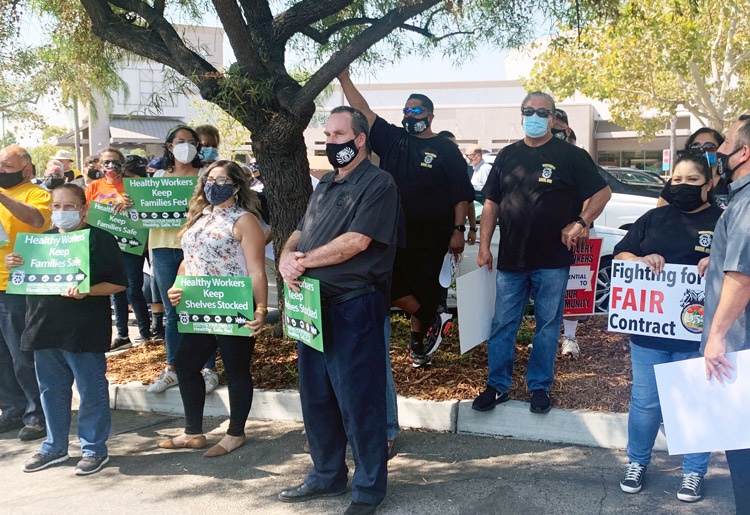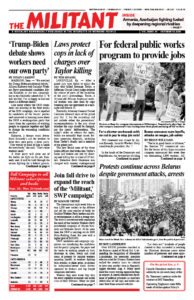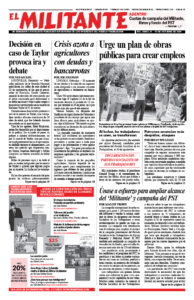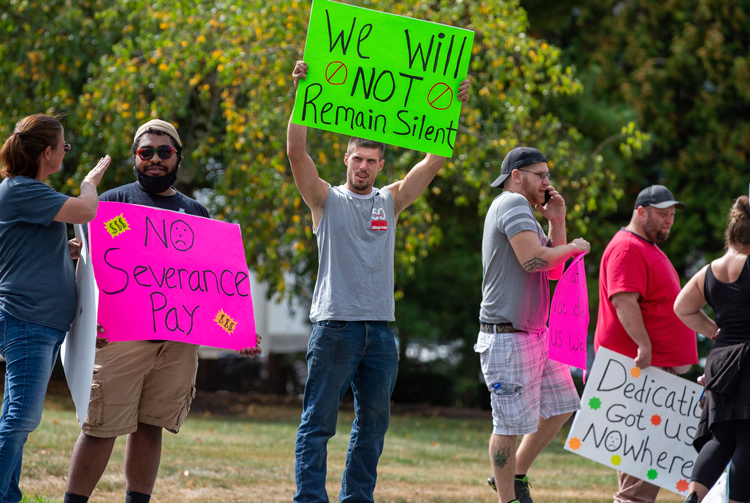“You’re in good hands at Allstate,” the familiar TV commercial says. But the bosses of this large insurance company announced this week they are eliminating 3,800 workers. Allstate is one of a number of big capitalist outfits slashing its workforce as a deep capitalist crisis that has upended the lives of tens of millions of working people continues to unfold.
American and United Airlines said they’ll be cutting a total of more than 32,000 jobs. Southwest Airlines bosses tried a different approach, saying they would limit layoffs if the union would agree to across-the-board pay cuts.
United Airlines got a $5 billion bailout from the federal government in the spring. Now they’re dumping over 20% of their workers.

U.S. Walt Disney Co. announced permanent layoffs of 28,000 workers at its theme parks in Florida and California, many of whom had already been on “temporary” furlough for months. Regal Cinemas said it’s closing all of its 663 movie theaters in the U.S. and U.K., cutting 45,000 workers.
As of mid-September, there are 26.5 million workers collecting state or federal unemployment benefits. And this doesn’t include millions more who haven’t been able to get benefits, including immigrant workers without papers and part-time workers not eligible for government programs.
For the week ending Sept. 26, nearly 1.5 million filed for various unemployment benefits, way over the 200,000 weekly applications in February before the pandemic began. The Pandemic Unemployment Assistance program set up to aid self-employed, gig and other workers not eligible for regular unemployment gave some relief to 11.8 million workers the week ending Sept. 12.
California officials were so overwhelmed by unemployment applications, and a backlog of nearly 600,000 filed earlier, as well as about a million filings for modifications for those already getting benefits, that they stopped processing September claims for two weeks.
Now officials in some states, including Colorado, Pennsylvania and Ohio, are telling workers they were overpaid and want thousands of dollars back. In Golden, Colorado, Autumn Stull, who owns a maternity and children’s consignment store, had her check cut from $618 a week to $223 because the state said she had been overpaid and owes $8,972, the Wall Street Journal reported.
Ohio government officials say over 108,000 people on the pandemic assistance program were overpaid, many because of errors by the unemployment agency.
This economic and social crisis was exacerbated by the coronavirus outbreak, but it is rooted in a long-term decline of capitalist production and trade.
The ruling capitalist families have held back from investing in new factories and capacity-expanding equipment to increase employment because it’s just not profitable enough. Instead, they’ve speculated on stocks, bonds, derivatives and all manner of other commercial paper — bets on future activity of all kinds — seeking higher returns. Instead of hiring, many companies have bought back their own stock, seeking to boost share prices. In 2018 such buybacks hit a record $806 billion.
Millions face utility shut-offs
Millions of people could face shut-offs of gas, water and electricity, as utility companies in 28 states ended moratoriums on monthly payments. While suspending collections, these companies didn’t waive the amounts owed, leaving workers with mounting debts.
Similar city and state moratoriums on rent payments have run out.
Also feeling the brunt of this crisis are small shopkeepers, many of whom have had to abandon their businesses, unable to cover rent and utility expenses.
In New York City, as many as half of its restaurants could close permanently over the next year, according to an audit by the state comptroller, eliminating up to 159,000 jobs. The report says that one-third of the city’s restaurants and half of its bars have shut down.
There are a few sectors of the economy that are growing and reaping profits today — including online retail giant Amazon, Walmart, Target, some large grocery chains and meatpacking bosses — but they’re doing so at the expense of workers’ safety and health on the job. Amazon admitted Oct. 1 that more than 19,000 of its “essential” workers contracted coronavirus since March.
The government insists that inflation is averaging a meager 1.3% this year. But this has a big impact on retirees, who depend on cost-of-living adjustments to their Social Security benefits to cover rising prices. “Social Security’s 2021 Hike Expected to Be Smallest in Years,” the Sept. 28 Investor’s Business Daily said. The figure, to be announced Oct. 13, may not even cover increases in Medicare insurance premiums.
The government’s distorted inflation figures are an average of all prices. As workers — and retirees — know, the cost of basic necessities like food, paper goods and much more are soaring. It’s cold comfort to know that the cost of luxury condos and yachts are declining, pulling the average down.
Figures from a Federal Reserve survey of family finances from 2016 to 2019 shows a widening gap in assets of the ruling capitalist families and their meritocratic professional and upper-middle-class hangers-on compared to the bank accounts of workers and farmers.
The top 1% of the U.S. population holds nearly 40% of the “wealth” today. Net worth — your so-called assets minus your debt — for the top 10% averages $1,220,000 today.
For the bottom 25%, we’re each “worth” $12,430 total.


